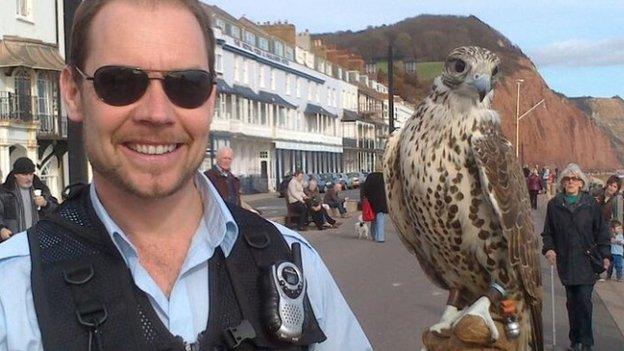'Super falcons' to deter 'nuisance' seagulls in Devon
- Published

Falconer Jonathan Marshall said the birds were crossed between a peregrine, gyr and saker falcon
"Super falcons" are being used by three coastal towns to try to stop "nuisance" seagulls disturbing people.
Councils in Exmouth, Sidmouth and Seaton are splashing out £15,000 in an effort to stop the gulls nesting.
Falconer Jonathan Marshall said: "The birds are crossed between a peregrine, gyr and saker falcon.
"Peregrines are the fastest, gyr are the largest and saker are very aggressive and persistent, which make a manmade super falcon."
'Petrified'
Simon Pollentine, chair of tourism committee in Sidmouth, said the "nuisance" gulls disturbed people who were eating outside and fouled on buildings.
"If we can deter them it's all for the best," he added.
Mr Marshall said of his falcons: "Seagulls are petrified of them, but the birds don't kill the gulls, that isn't the idea.
"The very presence is enough to scare the seagulls and prevent them from nesting."
Christopher Holland, Sidmouth's town clerk, said the falcons will fly three times a week - at different times of the day -and if the weather is poor, Mr Marshall will use a "falcon-shaped kite" in an attempt to unsettle the gulls.
Temporary amusement
The falcons will be used until the end of July, when the nesting season finishes.
A similar scheme was introduced in Scotland five years ago by Dumfries and Galloway Council, however it was later abandoned when the number of nesting gulls increased, external to 370 - an increase of 18.5% on the previous year.
The RSPB said it was unsure how effective the falcons would be.
"We wait with interest to see whether the "super falcon" is super enough to give Exmouth, Seaton and Sidmouth's gulls a fright," said the charity's representative Tony Whitehead.
"In my experience, gulls are not the most timid of creatures - they're also intelligent and may simply clock what's going on."
Mr Whitehead said being "set upon" by a herring gull was not a pleasant experience, but they would react aggressively to protect their young.
He also welcomed the councils' plan to distribute leaflets to hotels, restaurants and cafes asking people not to feed the gulls.
"While throwing chips and bread to our feathered seaside friends may provide temporary amusement, please don't, it just encourages them," he added.
- Published8 January 2013
- Published6 September 2012